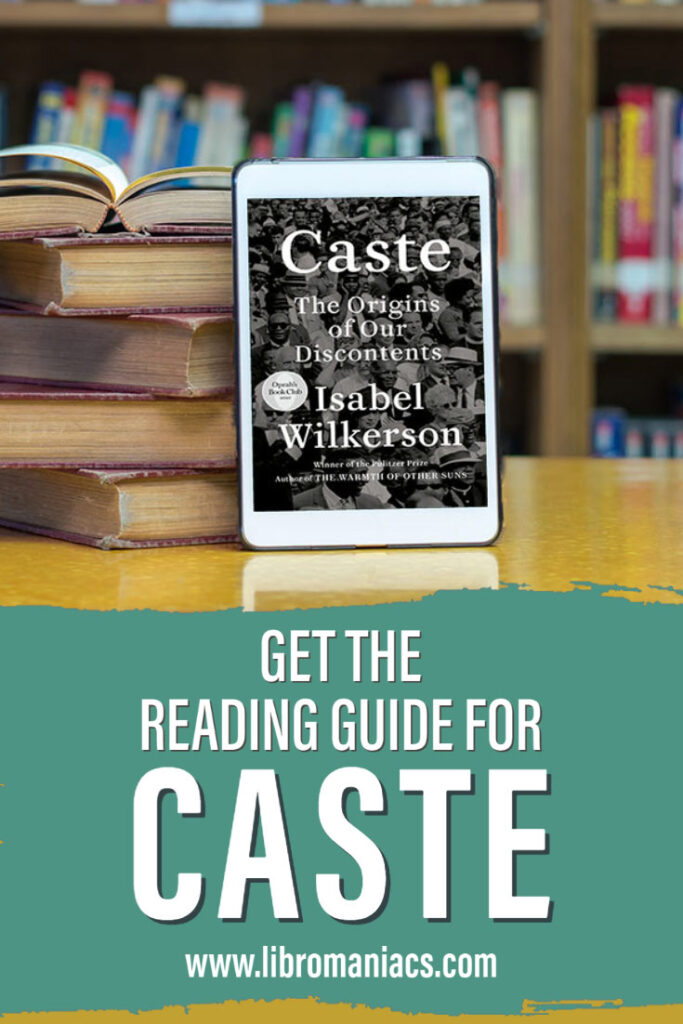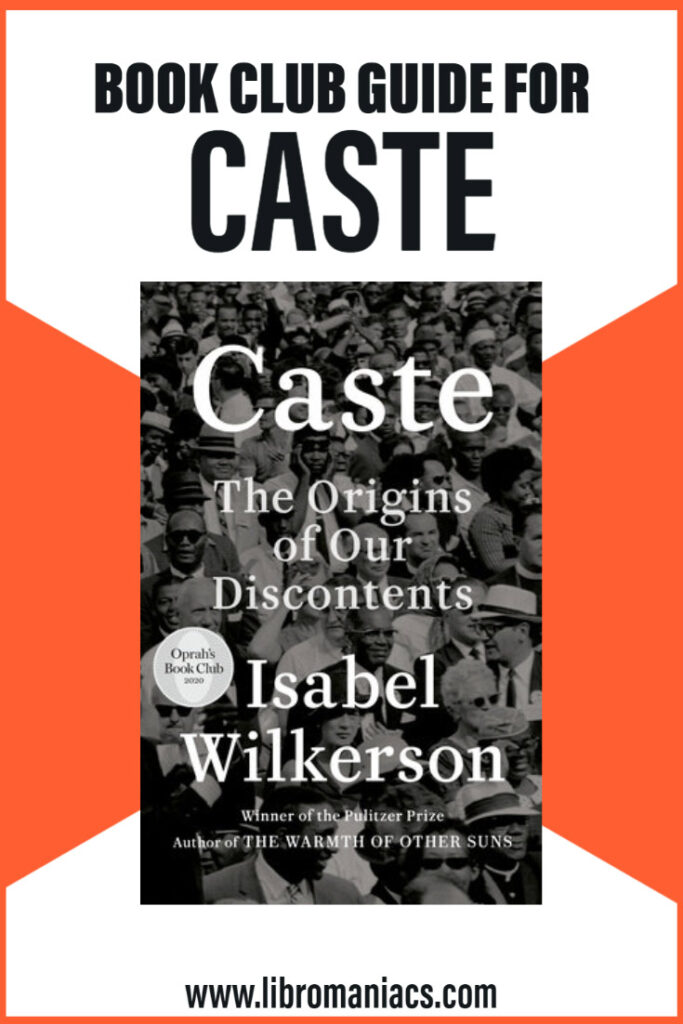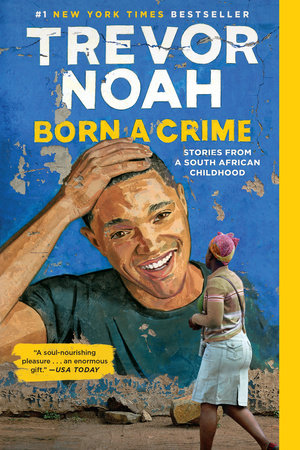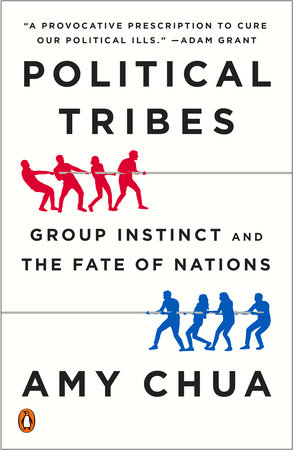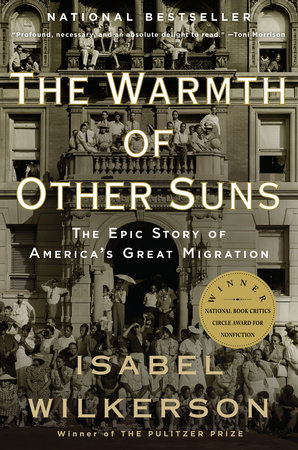Caste: The Origins of Our Discontents by Isabel Wilkerson takes a hard look at the destructive power of caste systems and racial segregation. In it, she elucidates the differences between caste, race and class, comparing the systems of Nazi Germany, India and America’s own legacy. Caste was an Oprah’s Book Club pic that lays bare both the obvious and the subtle ways that caste affects individuals and society.
Caste is a great book club read because it will allow your group to discuss the ways that we are all affected by and complicit in supporting caste systems. These Caste book club questions will help you get that conversation moving.
Start your book club discussion by looking at the publisher synopsis below. Does it accurately reflect your experience of the book. If not, what does it get wrong?
Then take a look at our 10 Caste book club questions, and read the selected reviews to get ideas for your discussion.
If you liked the book, we’ve also suggested three more books like Caste to add to your TBR pile.
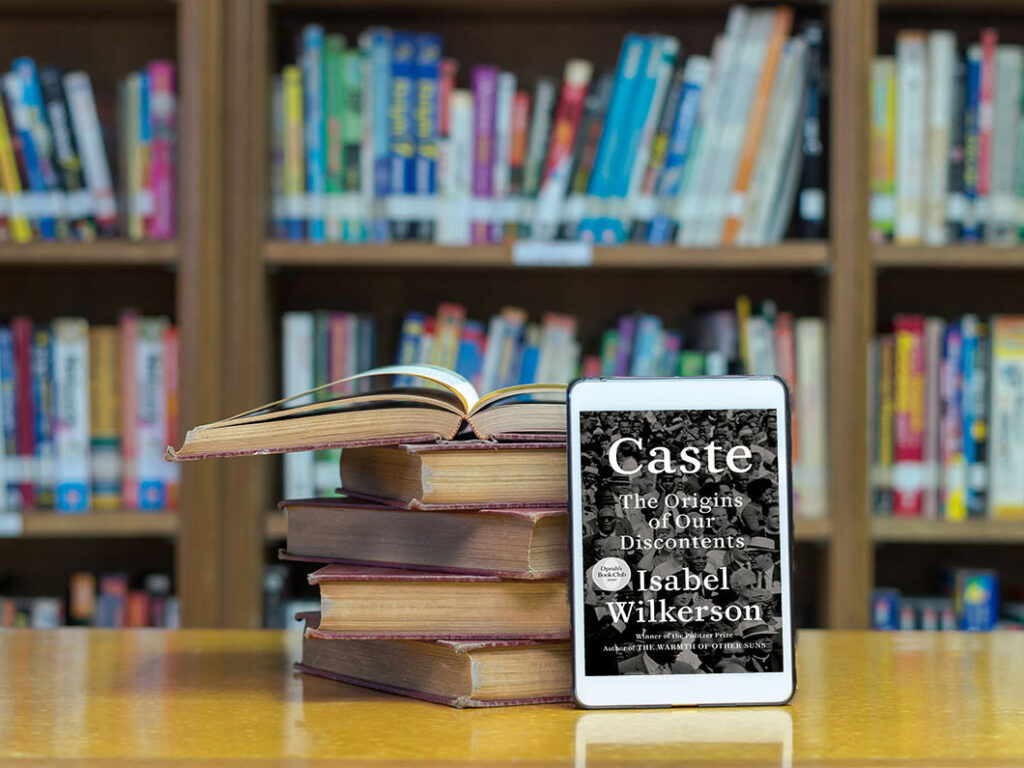
(This article contains affiliate links. This means that if you choose to purchase, I’ll make a small commission.)
Caste: The Origins of Our Discontents Book Synopsis
Caste: The Origins of Our Discontents, Isabel Wilkerson
“As we go about our daily lives, caste is the wordless usher in a darkened theater, flashlight cast down in the aisles, guiding us to our assigned seats for a performance. The hierarchy of caste is not about feelings or morality. It is about power—which groups have it and which do not.”
In this brilliant book, Isabel Wilkerson gives us a masterful portrait of an unseen phenomenon in America as she explores, through an immersive, deeply researched narrative and stories about real people, how America today and throughout its history has been shaped by a hidden caste system, a rigid hierarchy of human rankings.
Beyond race, class, or other factors, there is a powerful caste system that influences people’s lives and behavior and the nation’s fate. Linking the caste systems of America, India, and Nazi Germany, Wilkerson explores eight pillars that underlie caste systems across civilizations, including divine will, bloodlines, stigma, and more. Using riveting stories about people—including Martin Luther King, Jr., baseball’s Satchel Paige, a single father and his toddler son, Wilkerson herself, and many others—she shows the ways that the insidious undertow of caste is experienced every day. She documents how the Nazis studied the racial systems in America to plan their out-cast of the Jews; she discusses why the cruel logic of caste requires that there be a bottom rung for those in the middle to measure themselves against; she writes about the surprising health costs of caste, in depression and life expectancy, and the effects of this hierarchy on our culture and politics. Finally, she points forward to ways America can move beyond the artificial and destructive separations of human divisions, toward hope in our common humanity.
Beautifully written, original, and revealing, Caste: The Origins of Our Discontents is an eye-opening story of people and history, and a reexamination of what lies under the surface of ordinary lives and of American life today.
Caste Book Club Questions
- “Evil asks little of the dominant caste other than to sit back and do nothing. All that it needs from bystanders is their silent complicity in the evil committed on their behalf, though a caste system will protect, and perhaps even reward, those who deign to join in the terror.” Do you consider yourself a member of the dominant caste? If so, how have you or your family and friends been silently complicit? Have there been times when you sat back and did nothing?
- Wilkerson writes about how the Nazis studied the American caste system to help them devise their own system of segregation for not only Jews, but also Gypsies, LGBTQ people and others. In Trevor Noah’s Born a Crime, he also talks about how White South Africans studied the American Jim Crow system and incorporated some of the same strategies into Apartheid. Were you aware this notorious American export? If not, how did you react when you read that?
- Staying on the Nazi’s for a moment– Germany felt such shame after WWII, they went to great lengths to dismantle their caste system. “… It is living proof that if a caste system—the twelve-year reign of the Nazis—can be created, it can be dismantled.” And yet, many people in the US remain in denial about our caste system and its consequences. What would it take to dismantle our own caste system?
- Wilkerson posits that caste, class and race are not the same things. And yet they seem very similar. What is the difference between the three? Did you agree with her distinctions between them?
- The book talks about the artificial construct of “Black” and “White”. The Irish and Polish weren’t “White” until they emigrated to the US. The slaves brought over from Africa weren’t “Black” in their home villages. They were just from their tribe. And because everyone on the continent was “Black”, the distinction was meaningless. How is this artificial construct playing out in modern society?
- The book’s synopsis mentioned the “cruel logic of caste”, whereby those in the middle rung are motivated to keep someone firmly planted on the rung below them, if only so that they themselves aren’t on the bottom. What are some examples from the book (or even your own life) that illuminate this complicity?
- “A caste system endures because it is often justified as divine will, originating from sacred text or the presumed laws of nature, reinforced throughout the culture and passed down through the generations.” What are some examples of how this “divine will” has been rationalized in the Indian, Nazi and American caste systems?
- Considering what you’ve learned about caste from reading the book, how does that information inform what you’ve observed about the Black Lives Matter movement?
- Has the book made you more aware of unconscious bias in your own life. Have you been on the receiving end of it? Have you doled it out?
- What are one or two actions that you can take that can begin to dismantle our caste system?
Selected Caste Reviews
“A different perspective almost always enhances understanding. Sometimes labeling with a different word can shape-shift a subject into a slightly different perspective revealing additional layers of meaning. I think that’s what Wilkerson has done by using the word “caste” to describe what others have described as structural, institutional, or systemic racism.”
“One of the most important points she makes is that racism is not just the personal hatred by one person, but a systematic abuse, often so deeply ingrained in society as to be oblivious to those in the upper caste. And that the upper caste will do everything to keep their privilege intact.”
“Wilkerson’s thesis is ostensibly ridiculous as a description of contemporary America, which is actually organized as a hierarchy of competence where competence is roughly determined by free market forces…a meritocracy in other words. This is not a work that is seeking to achieve the racial reconciliation and harmony of a post-racial America where all races and creeds can cash the promissory note of the American founding and the American dream. It wallows in the racial sins and misery of America’s past (slavery, lynching, and Jim Crow) and labels those evils as America’s essence rather than the chronic disease that America has always aspired to eliminate.”
“…what you take from reading Caste depends on the level of knowledge and lived experience you bring to it. I found it to be repetitive both within its own pages and in terms of what I know from reading other books, articles and columns covering this same subject matter…I read and discussed Caste over a 7-week series of meetings with a Zoom book club…I observed that those readers who knew the least going-in, found Caste to be the most impactful, a major eye-opener, as it were. In contrast, the two of us who have been engaged intensely on this topic for decades found it to be fine but it didn’t bring new insights or learnings.”
3 Books Like Caste
Like Caste, Between the World and Me by Ta-Nehisi Coates also talks about race as a construct. We have a book club guide for it if you’d like to explore it with your club. Our guide for Chain Gang All-Stars also explores race and incarceration in a satirical take on the prison industrial complex.
Born a Crime: Stories from a South African Childhood
by Trevor Noah
Wilkerson doesn’t cover Apartheid in Caste, but it was also a brutally effective caste system in South Africa. Noah was born there, the illegal product of a Black mom and White dad. Born a Crime tells the story of Noah’s childhood. He shares how tricky it was growing up right as Apartheid was coming apart. He used his ambiguous ethnicity to color-switch and he and his mom had to really hustle just to survive.
This is a great next read if you want to see how Wilkerson’s views on caste play out in real life.
Then, once you’ve read it…just our Born a Crime book club guide to discuss it with your friends.
Political Tribes: Group Instinct and the Fate of Nations
by Amy Chua
Chua isn’t tackling race and caste exclusively. But she does look at it in the context of political tribalism and American policy. She explains how tribalism is a misunderstood but crucial social phenomenon, and one that explains how hearts, elections and wars are lost and won. The book doesn’t have a right or left political bias, but it does cover America’s lack of bi-partisan cooperation, extremism and our lack of national unity.
The Warmth of Other Suns: The Epic Story of America’s Great Migration
by Isabel Wilkerson
The caste system in America’s Jim Crow south was so oppressive that it triggered a mass migration of African Americans out of the region. From 1915-1970 nearly 6 million people moved to places like New York, Chicago, Los Angeles and Oakland, seeking a better life. The book covers the migration as a movement, but it also has very intimate portraits of three people who chose to leave.
Think of The Warmth of Other Suns as a companion piece to Caste as it offers insights into how the system affected the people trying to flee it.
Have a listen on Audible. Try audio books for free for 30 days.
Share this Caste book club discussion guide on Pinterest:
